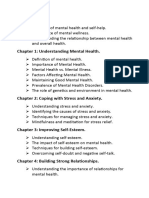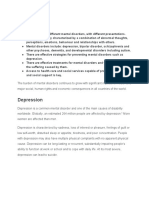Importance of Learning About Mental Health.
Importance of Learning About Mental Health.
Uploaded by
marquezjeremy25Copyright:
Available Formats
Importance of Learning About Mental Health.
Importance of Learning About Mental Health.
Uploaded by
marquezjeremy25Original Description:
Original Title
Copyright
Available Formats
Share this document
Did you find this document useful?
Is this content inappropriate?
Copyright:
Available Formats
Importance of Learning About Mental Health.
Importance of Learning About Mental Health.
Uploaded by
marquezjeremy25Copyright:
Available Formats
Janiel Karl B.
Marquez
10-Orion
Importance of learning about mental health.
It should go without saying, not everyone seems to understand how important mental health is.
Finding strategies to support mental health is just as useful as preserving it, given its critical role
in overall wellbeing. One can take proactive steps to attain good mental health even if they
already suffer from a mental health illness, such as depression or anxiety, or if they develop one
concurrently with a substance use disorder. What constitutes sound mental health and what
factors support it? Here are a few things to think about.
Possessing excellent mental health goes beyond simply not suffering from a mental condition
like schizophrenia, bipolar disorder, sadness, or anxiety. A mentally healthy individual is aware
of their skills, capable of handling everyday stressors, able to regularly work in a productive
manner, and able to give back to the community. As a construct, mental health is the cornerstone
of well-being and efficient functioning for both individuals and their societies.
It requires action to support mental wellness. Encouraging mental health involves a range of
tactics, all geared toward improving mental health. These include initiatives and tactics aimed at
fostering environments and living circumstances that promote mental health and enable
individuals to embrace and sustain healthier lifestyles. The variety of options also means that
there are more chances for everyone to experience the positive effects of mental wellness or to
enhance their mental well-being.
Just like with illness and general health, there are a variety of factors that might impact mental
health and mental health disorders. These variables frequently interact and contain biological,
social, and psychological components.
According to specialists, a number of poverty indicators are linked to some of the most
convincing data. Low income, poor housing, and low educational attainment are a few of them.
As socioeconomic disadvantages rise and continue, there is a tendency for risks to mental health
to develop for both people and groups. Furthermore, those from underprivileged backgrounds are
more susceptible to mental health issues. Other factors include the speed at which society is
changing, the likelihood of violence, physical health issues, and feelings of hopelessness and
insecurity may contribute to some of this.
Policies and an atmosphere that uphold and defend fundamental civil, cultural, political, and
socioeconomic rights are necessary for good mental health. For people to attain and preserve
excellent mental health, they must feel safe and free to exercise these rights.
You might also like
- Refrigerator Sheet How To Talk So Kids... Listen So Kids Will TalkDocument1 pageRefrigerator Sheet How To Talk So Kids... Listen So Kids Will TalkTrisco LeeNo ratings yet
- NArration MentalHealthDocument2 pagesNArration MentalHealthKeiren DesuNo ratings yet
- Investigacion 1718416447543Document5 pagesInvestigacion 1718416447543ayestasmichelleNo ratings yet
- Module 2 Mental Health Awareness RevisedDocument10 pagesModule 2 Mental Health Awareness RevisedcNo ratings yet
- The Silent Epidemic: Exploring The Complexities of Mental Health IssuesDocument2 pagesThe Silent Epidemic: Exploring The Complexities of Mental Health IssuesdysiredsunNo ratings yet
- Unit IDocument9 pagesUnit IAnanta ChaliseNo ratings yet
- Importance of Mental HealthDocument2 pagesImportance of Mental HealthCp CsNo ratings yet
- Understanding Mental HealthDocument1 pageUnderstanding Mental HealthJes Espago VillaramNo ratings yet
- The Importance of Mental Health Awareness in SocietyDocument2 pagesThe Importance of Mental Health Awareness in SocietypeaceNIKNo ratings yet
- Mental Health and Its ImplicationsDocument16 pagesMental Health and Its Implicationsk ucheNo ratings yet
- Mental Health 123Document98 pagesMental Health 123itsss mylifeNo ratings yet
- Declining in Mental HealthDocument25 pagesDeclining in Mental Healthriya6370srivastavaNo ratings yet
- The Importance of Mental Health Awarenes1Document2 pagesThe Importance of Mental Health Awarenes1mondalbike830No ratings yet
- The Importance of Mental HealthDocument3 pagesThe Importance of Mental HealthDubravko Kozaric100% (1)
- Few Factors That Affect Mental HealthDocument9 pagesFew Factors That Affect Mental HealthAubrey SomozaNo ratings yet
- Speech Text - Mental HealthDocument2 pagesSpeech Text - Mental Healthjohnny suhNo ratings yet
- Mental Health AwarnessDocument2 pagesMental Health AwarnessHamzaNo ratings yet
- EssayDocument4 pagesEssayCHUA YAN TING STUDENTNo ratings yet
- Running Head: HEALTH EDUCATION 1Document10 pagesRunning Head: HEALTH EDUCATION 1Sammy GitauNo ratings yet
- Specific PopulationDocument10 pagesSpecific PopulationSammy GitauNo ratings yet
- Ensayo MaiDocument4 pagesEnsayo MaiMontaño MairisNo ratings yet
- TitleDocument1 pageTitlehikarihidalgo143No ratings yet
- Mental HealthDocument5 pagesMental HealthSofia Cinderella QuimoNo ratings yet
- Health Psychology Notes Mod.1Document24 pagesHealth Psychology Notes Mod.1iramepani.workNo ratings yet
- Mental Disorders: Key FactsDocument9 pagesMental Disorders: Key Factssoshi2691loveNo ratings yet
- Health Impact Pyramid Framework Research Paper On Global Health: Mental HealthDocument9 pagesHealth Impact Pyramid Framework Research Paper On Global Health: Mental Healthapi-534714258No ratings yet
- The Rise of Mental Health During A PandemicDocument3 pagesThe Rise of Mental Health During A PandemicLondon College of Clinical Hypnosis MalaysiaNo ratings yet
- Mental Health Is All About How People ThinkDocument5 pagesMental Health Is All About How People ThinkresyaniNo ratings yet
- Mentel HelathDocument49 pagesMentel Helathjaganath198uNo ratings yet
- Mental Disorders: Key FactsDocument4 pagesMental Disorders: Key FactsSalfiana RikoNo ratings yet
- Untitled DocumentDocument2 pagesUntitled DocumentKyraaNo ratings yet
- Mental DisordersDocument6 pagesMental DisordersJay ConnorNo ratings yet
- Understanding Mental HealthDocument2 pagesUnderstanding Mental HealthckristenejoycervantesstudNo ratings yet
- The Significance of Mental Health AwarenessDocument2 pagesThe Significance of Mental Health Awarenessshin shin shinNo ratings yet
- E Notes Dimension of Health 2Document4 pagesE Notes Dimension of Health 2Jenesha MuraliNo ratings yet
- The Importance of Mental Health AwarenessDocument2 pagesThe Importance of Mental Health AwarenessGalih PutraNo ratings yet
- Primary Health CareDocument13 pagesPrimary Health CareJeanNo ratings yet
- Mental Health EssayDocument2 pagesMental Health EssayROHITNo ratings yet
- Mental HealthDocument2 pagesMental HealthAngel Myca M. SembranoNo ratings yet
- The Pursuit of Human HealthDocument4 pagesThe Pursuit of Human Healthbishwabandhurokka49No ratings yet
- Untitled DocumentDocument7 pagesUntitled DocumentYohana Prastyanti DhitardewiNo ratings yet
- Mental HealthDocument2 pagesMental Healthzyrl1235No ratings yet
- Introduction To Health PsychologyDocument9 pagesIntroduction To Health PsychologyaabhaNo ratings yet
- Mental Health, Physical Activity and Physical Therapy: ExerciseDocument8 pagesMental Health, Physical Activity and Physical Therapy: ExerciseMoVaEm7No ratings yet
- Gabriel M RosalesDocument2 pagesGabriel M RosalesGabriel Rosales RM RNNo ratings yet
- In Order To Achieve Their Optimal Level of WellnessDocument3 pagesIn Order To Achieve Their Optimal Level of WellnessVINCENT MUHARINo ratings yet
- Mental HealthDocument4 pagesMental Healthvhen adrian villanuevaNo ratings yet
- make my mental health a priorityDocument21 pagesmake my mental health a priorityMedo HamadNo ratings yet
- Mental HealthDocument3 pagesMental HealthSachin GaireNo ratings yet
- Thriving Mind: Nurturing Personal Growth and Meaningful ConnectionsFrom EverandThriving Mind: Nurturing Personal Growth and Meaningful ConnectionsNo ratings yet
- Freedom : Tips for men and women on how to live a mentally healthy lifeFrom EverandFreedom : Tips for men and women on how to live a mentally healthy lifeNo ratings yet
- Dimensions of HealthDocument4 pagesDimensions of HealthJasper Pangilayan OrañolaNo ratings yet
- Importance_of_Mental_Health_Awareness_ASCIIDocument3 pagesImportance_of_Mental_Health_Awareness_ASCIIanuragsenapati48No ratings yet
- How To Make A CakeDocument2 pagesHow To Make A CakeflorentinokobtmuaNo ratings yet
- The Importance of Mental Health Awarenes1Document2 pagesThe Importance of Mental Health Awarenes1celiadessardNo ratings yet
- ASEAN Plan of Action On Science, Technology and Innovation (APASTI) 2016 2025Document63 pagesASEAN Plan of Action On Science, Technology and Innovation (APASTI) 2016 2025Nguon SamnangNo ratings yet
- Iana Codruta PsyhearchitectureDocument12 pagesIana Codruta PsyhearchitectureCodrutza IanaNo ratings yet
- Hamorawon Heading W LogoDocument15 pagesHamorawon Heading W Logoesteban semianoNo ratings yet
- JA608 Service ManagementDocument2 pagesJA608 Service ManagementNareesh RajNo ratings yet
- Four Types of EssayDocument4 pagesFour Types of EssaysherrykflimNo ratings yet
- PE Kto12 CG 1-10 v1.0Document69 pagesPE Kto12 CG 1-10 v1.0joeric1100% (3)
- Embedded Commands WorkbookDocument13 pagesEmbedded Commands WorkbookOussama HassaniNo ratings yet
- Leadership and Management of Change: BITS Pilani BITS PilaniDocument17 pagesLeadership and Management of Change: BITS Pilani BITS PilanivikramtambeNo ratings yet
- Neopatriarchy Islam and Female Labour Force ParticipationDocument22 pagesNeopatriarchy Islam and Female Labour Force ParticipationMojca ŽerovecNo ratings yet
- Comprension Textos OralesDocument4 pagesComprension Textos OralesKasio GermánNo ratings yet
- Apa CitationDocument15 pagesApa CitationChichiro NguNo ratings yet
- CH 3 Ethical DilemmaDocument23 pagesCH 3 Ethical DilemmaSahil ParmarNo ratings yet
- Amity Business School: Marketing of ServicesDocument82 pagesAmity Business School: Marketing of ServicesArpit NegiNo ratings yet
- FatherlandDocument32 pagesFatherlandYuliya StelmashonokNo ratings yet
- CH 10 Understanding Work TeamsDocument14 pagesCH 10 Understanding Work TeamsKatherine100% (3)
- Lesson Plan ColorDocument2 pagesLesson Plan Colorapi-317303624No ratings yet
- Rocine 3Document55 pagesRocine 3Nevenka Blažik100% (1)
- Topic 1 - What Is Art - Introduction and AssumptionsDocument3 pagesTopic 1 - What Is Art - Introduction and AssumptionsKeen Jude CaminosNo ratings yet
- Anti Plagiarism ChecklistDocument1 pageAnti Plagiarism ChecklistShamshul DidarellyNo ratings yet
- EVNT 1300 - Event Planning & Management - ThorntonDocument7 pagesEVNT 1300 - Event Planning & Management - Thorntonbuggs1152No ratings yet
- Daycare Center FacilityDocument10 pagesDaycare Center FacilitysidhanthaNo ratings yet
- LP MondayDocument4 pagesLP Mondayelle celesteNo ratings yet
- Combine Sample PapersDocument114 pagesCombine Sample Papersbhawnaagarwal1004No ratings yet
- The Spanish Journal of Psychology Volume 16Document8 pagesThe Spanish Journal of Psychology Volume 16GOOSI666No ratings yet
- Volum Afases 2016Document502 pagesVolum Afases 2016robert0% (1)
- Best Practices of Public Speaking 2Document28 pagesBest Practices of Public Speaking 2Cassey Bayos100% (1)
- Conflict and Resolution Presentation.Document17 pagesConflict and Resolution Presentation.Raudzah ZainuddinNo ratings yet
- The Lost Writings of Wu Hsin, Volume One: Aphorisms For Thirsty Fish (Sample)Document35 pagesThe Lost Writings of Wu Hsin, Volume One: Aphorisms For Thirsty Fish (Sample)Roy Melvyn100% (12)
- David Kaplan - A Magical Enetrtainer's Guide To Character and CreativityDocument14 pagesDavid Kaplan - A Magical Enetrtainer's Guide To Character and CreativityAnonymous bxsB9E100% (4)

























































































